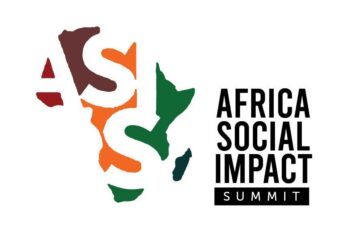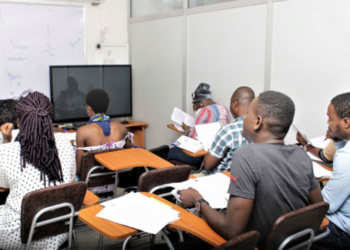Nigerians looking to exit the country in exchange for foreign education and a better life are fueling billions of naira in revenue for British Council.
Nairametrics estimates suggest Nigerians who rely on British Council for exams spend roughly N90,000 per sitting to prove they can speak and write good English by participating in the International English Language Testing System (IELTS) exams conducted by the British Council.
Recommended Reading: How to apply for Luxembourg scholarship
In preparation for the test, many also enrol in coaching classes which cost as much as N45,00 to ensure they pass the test in a sitting.
For many Nigerians writing the exam, it is one big hurdle that they have to cross to realise their dream of leaving the country. Folasade Adeyemo is in this category. According to her, she had sat for the IELTS exam last year and could not meet the required pass mark, so she had little choice but to enrol for coaching classes in the hopes that she will pass the test this October so that she can travel to the UK for her Master’s programme.
Another applicant, who would not want his name mentioned, is preparing to write the IELTS in order to relocate to Canada as a skilled immigrant. Having obtained a Master’s degree in English Language from one of the leading private universities in Nigeria, he believes subjecting himself to an English test would amount to ridiculing the education system in Nigeria, but he has to write it.
“It is really embarrassing that I have to write this test before I can travel after studying English Language at undergraduate and post-graduate levels, but since it is one of the conditions to apply for the Visa, I have to,” he said.
For David Ayinde, who took the IELTS exam in 2015 and passed but could not travel due to financial constraints, is pained that he would have to pay again to re-write the exam since the one he wrote had 2 years validity. “I see it as extortion. Why should the result have an expiry date? Does it mean I no longer understand the English Language or I have lost my memory?” he queried.
British Council continues to cash out
While there is no official figure for the number of Nigerians writing the test annually, the British Council on its website listed the cost of writing the test as ranging from N83,000 to N89,500.
The International Centre for Investigative Reporting (ICIR) in a recent report quoted an exams invigilator working with the organisation in Nigeria as saying that an average of 120 people write the test at a centre on each day with up to five test dates per month.
There are 11 test centres run by the British Council in Nigeria. This translates to roughly N7.732 billion in revenue for the Council every year.
Efforts to reach the British Council in Nigeria for comments proved abortive as an email sent to its Head of Communications, Edemekong Uyoh, was not responded to.
To underscore how crucial the IELTS and other educational revenues are to the British Council is how it went near bankrupt during the lockdown occasioned by the coronavirus pandemic. Politico reports that the pandemic forced the British Council to shut down 44 out of its 47 English language schools and 195 of 223 test centres around the world, according to a spokesperson for the organization. This effectively cut off its main source of income and created a substantial budget deficit. The Council gets an annual grant of 161 million pounds from the British government.
Agitation to end IELTS in Nigeria
Amidst the rush to leave the country, some Nigerians are agitating to put an end to the IELTS test in Nigeria. An online petition to this effect which is being coordinated by Policy Shapers, a youth-led open-source platform for policy ideas, has gathered 79,574 signatures as of the time of filing this report.
According to the Policy Shapers Founder, Ebenezer Wikina, the petition is being put forward to end ‘the unjust treatment of Nigerians and Africans’. According to him, “the UK Home Office has a list of 18 countries whose citizens are exempt from writing an English proficiency test (IELTS, TOEFL, etc.) when they seek to study or migrate to the UK, including; Antigua and Barbuda, Australia, the Bahamas, Barbados, Dominica, Grenada, Jamaica, Malta, St Kitts and Nevis, Trinidad and Tobago, to mention a few. However, it will interest you to know that there is no Anglophone African country (out of 20+ English-speaking countries on the continent) on the Home Office list. Not Nigeria, not Ghana, not Kenya, not South Africa. Despite the fact that these African countries are former British colonies and belong to the Commonwealth! Why?”
What the petitioners are saying
Nigerians who have signed the petition on change.org also used the avenue to express their displeasure with the idea of making IELTS compulsory for Nigerians who want to travel to the UK, Canada, and other countries.
Citing her reason for signing the petition, Fiona Lovatt wrote: “Every Nigerian with WAEC or NECO has been examined in English. These are the people who must then find a great deal of money to sit for IELTS. As a members of the Commonwealth and as major contributors to the economic and military might of the UK, some issues of parity and equity are missing in the current policy which seems designed to continue to underdevelop Africa.”
Another petitioner, Winifred Otokhina, wrote: “Nigerians are being extorted on a daily basis because of IELTS. English is our official language and so we have no business writing IELTS. The price keeps increasing every year for no reason. There needs to be a stop to this.”
“Nigerians speak and use the English Language widely as a first and official language in the country. It is only fair and justifiable not to require or stop any Nigerian seeking to study or work in the UK and similar countries to write IELTS and/or other English proficiency tests before they can be allowed entry or to work in the country,” wrote Kazeem Seidu
Another petitioner, Afiz Salimanu, wrote: “It makes no sense asking a Nigerian graduate to write a test of English. An average educated Nigerian’s first language is English, we get taught in English, so the additional tests makes no sense, I see it as an avenue just to make money.”
John Blessing also wrote: “I’m signing because I need to take IELTS to go to the university in the UK even after submitting my English language result of B3. Paying N89,500 for the test before paying my tuition fees and other expenses pre/post visa application is just too much.”
What you should know
- Established in 1989, IELTS has been jointly managed by the British Council, the International Development Programme (IDP) Australia, and the University of Cambridge English Language Assessment.
- It is administered mostly to non-native English speakers and recognised by over 10,000 organisations and governments in more than 140 countries.
About the British Council in Nigeria
- But the British Council is not about taking from Nigerians. Set up in 1943, it is “supporting young people to achieve the education, qualifications and skills needed to reach their potential in their future careers.
- creating and developing new networks and platforms to give young people a voice in society.
- Providing training, grants and scholarships to Nigerians to achieve their dreams through programmmes like:
- Nigeria Creative Enterprise Support Programme delivered in partnership with the Foreign and Commonwealth Office was a programme designed to connect Creative Entrepreneurs and institutions in the fashion and film sectors to share, learn and collaborate in order to develop skills that lead to more professional opportunities for Nigerian entrepreneurs, stimulate UK-Nigeria Hub linkages and help improve their livelihood outcomes.
- GREAT Scholarships for a sustainable future are for students from Nigeria who want to study at a UK university for a one-year postgraduate course in a climate change-related subject. Each scholarship offers a minimum of £10,000 towards tuition fees.
- Entrepreneurial Africa programme provides support and opportunities to emerging entrepreneurs through competitions, mentoring, training and business clinics as well as conferences, showcases and forums. It aims to foster the development of new skills, stimulate collaboration and new approaches to entrepreneurship while unlocking their potential to contribute to a new Africa
- The Council has been reported to commit 38 million pounds in collaboration with the Department For International Development (DFID), to improve teaching and learning in Nigeria and over 30 countries worldwide.
























In a country where English is our official language, it is ridiculous that Nigerian students have to sit for IELTS to prove that they can speak or understand English. Honestly we need to jettison our colonial mentality and stop subjecting ourselves to the whims of oppression. The amount of money that flows out of Nigeria in the name of foreign education is astronomical. Not to talk of the brain drain.
We need leaders who value education & have the confidence and patriotism to rebuild & revamp our once-enviable education system in Nigeria. Not the ones who send all their children to schools abroad from the proceeds of stolen national wealth.
It baffles me how a leader will not want progress for his/her own country.
Why are these folks surprised they’re required to take the test, when do many Nigerian graduates struggle to speak proper English?!